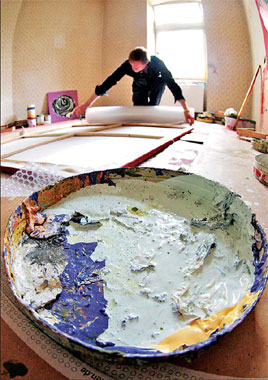'Unfinished Canvas' of Berlin draws artists of all colors
If you're an artist and you dream of honing your skills alone in a tiny garret, hungry and cold but filled with inspiration, then Berlin may not be for you.
Because there is no such thing as a starving artist here.
Thousands of creative artists have flocked to this German city, drawn by low rents, cheap food, state support and the chance to be part of a community bubbling with ideas - and live in a city that in many ways is an unfinished canvas itself.
They have turned Berlin into a 21st century hotspot for painters, actors, writers, filmmakers, musicians and designers.
|
Painter Finbarr Kelleher works in his studio in Berlin's Prenzlauer Berg district last week. He is one of many artists who have flocked to Berlin from across the world. Reuters |
"It's got a wonderfully creative environment," said Bonaventure S.B. Ndikung, 31, an artist and curator from Cameroon who settled here more than a decade ago.
"The city's inspiring, it's multicultural, it's diverse and best of all costs are low. You only have to sell things every once in a while to get by."
In the past, artists have flourished in other cheap cities during tough economic times - such as New York in the early 1970s and London late in that decade.
Now, it's happening in Berlin where, for instance, it costs a painter like Finbarr Kelleher from Ireland only 550 euros a month for his roomy flat and large studio in the trendy Prenzlauer Berg quarter.
Berlin is home to some 25,000 artists, a study by the DIW economic think-tank found. They're from Germany and Europe but also from Asia, especially China and Japan, and North America.
DIW said many get by on less than 10,000 euros a year and the median annual income is about 18,000 euros.
Berlin's economy is weak and its cost of living is low because unemployment is relatively high at about 15 percent, rental property is readily available and population growth is stagnant.
"You're poor but you're so free because you've got no responsibilities, you're free from the pressures of life," said Kelleher, who came via Barcelona from Ireland and stayed after discovering a pulsating art scene in Berlin in 1999.
"You have no money but you have so much freedom and time, and if doing something creative is what you want to do, time is what you need," added Kelleher, 39, who now earns about 20,000 euros a year after initially getting by on less than half that.
Exchange of ideas
Yet those in the creative crowd say it is more than the cheap rents and low costs that makes Berlin special.
"You can't put a price on the value of exchanging ideas," said Ndikung. "You can meet writers, musicians or designers at a cafe and it makes your day. You'll discover something new or just listen. No one cares about money. It's all secondary."
Swiss-born director Dani Levy agreed. He moved to the city in 1980 and later helped start what is now one of Europe's top independent film producers, X-Filme Creative Pool.
Coming from Switzerland, at first he was shocked by West Berlin's flourishing art scene and vibrant counter-culture.
"But, I fell in love with the theatre scene and whole way of life. It's a real buzz."
The city of 3.4 million was devastated during World War Two and split by the Berlin Wall during the Cold War. The big banks and industry that had made Berlin a prosperous European capital between the wars abandoned the divided city.
Yet those ravages, ironically, helped create a fertile environment for the arts. Even though the population has been stagnant since 1990, that figure masks tremendous upheaval: more than 1.7 million moved away and 1.7 moved to Berlin since 1990.
"It may seem rather surprising at first that about half the city's population has come and gone in the last 15 years," Berlin Mayor Klaus Wowereit said.
"But it's due to large numbers who moved to new suburbs just outside Berlin after the Wall fell and a high number of people, especially students and young people, who moved in since 1990."
Artists are welcomed by Wowereit, Germany's first openly gay political leader who gave the city its hip slogan "Berlin is poor but sexy", and helped lure film and music companies to the German capital since taking office in 2001.
Agencies
(China Daily 08/07/2008 page37)















